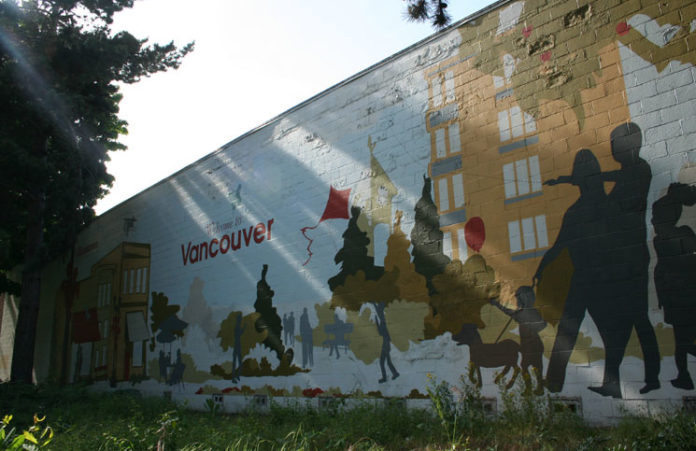As the final year of Vancouver’s Innovation Partnership Zone (IPZ) designation comes to a close, officials are looking back at the program’s successes and readying the case for re-designation.
In 2013, the Washington State Department of Commerce awarded a four-year ‘digital technology acceleration’ IPZ to downtown Vancouver’s start-up community and the technology campuses along the 192nd corridor. The mission of the IPZ program, according to the City of Vancouver’s website, is to grow the need and market for applied digital technologies in areas such as business, education, health and medicine, and communication by fostering education, research and economic partnerships.
That mission has resulted in partnerships with more than 40 digital and tech businesses, seeking to build relationships in three ways:
- Between the people who educate and train the future workforce and those who will employ them;
- Between cities that provide infrastructure and the businesses that use it; and
- Between economic development organizations and the entrepreneurs and businesses they serve.
The Department of Commerce sums these relationships up with the idea that companies wanting to do business in the region have the option of locating in a unique environment that brings research, workforce training and private sector businesses together in close geographical proximity to create new companies, products and jobs.
And locate here they have; between 2013 and 2016, Vancouver’s downtown tech sector more than tripled in size, growing from 12 to about 45 tech and digital marketing companies.
“From VDA’s perspective, our downtown is much more vibrant because of the creatives who are now clustered here,” noted Lee Rafferty, executive director of Vancouver’s Downtown Association (VDA).
Mike Bomar, president of the Columbia River Economic Development Council, agreed.
“The IPZ has helped coalesce a previously fragmented community of technical and creative innovators, spurring a growing network of software and web companies while fostering a discernible start-up culture.”
George DeCarlo, founder of Woobox, a local tech company and both a business partner and management partner within the Vancouver-Camas IPZ, knows firsthand the impact of the IPZ and the assistance it has provided.
“Woobox’s role in the IPZ is as a partner to help bring the perspective of business to the table,” said DeCarlo. “Helping entrepreneurs succeed is something I’m personally very passionate about, and the IPZ is one outlet to help accomplish that.”
Seeking renewal
Since IPZ designations last for only four years, the City of Vancouver must apply for renewal in order to formally uphold the current cluster and network of businesses created with the IPZ.
Teresa Brum, economic development division manager for the City, believes the Vancouver-Camas area is on track to receive an IPZ re-designation and understands the significance of attaining another four-year designation.
“The Vancouver IPZ has met all of the IPZ program requirements so far, and so we don’t anticipate any impediments to a renewed designation,” said Brum. “Another four-year designation would give Vancouver the opportunity to further enhance the IPZ program.”
The timeline for renewal consists of the completion of an ‘Intent to Apply and Threshold Application’ due July 14 and the ‘IPZ Designation Application Part 2’ due Aug. 7. The Washington State Department of Commerce will then make their final re-designation decisions by Oct. 1. If the Vancouver-Camas IPZ receives renewal, the city must submit a new ‘Business Plan’ by Nov. 15.
“The CREDC, along with our close partners at the City of Vancouver and Camas, are actively working to pursue renewal of the IPZ designation for the Vancouver-Camas geographic area,” said Bomar. “We are optimistic that the designation will be renewed for another term, allowing the City of Vancouver and Camas, CREDC and our partners to continue to expand and grow [the] impact of the designation and implement a long-term structured business support framework focused on our growing technology cluster.”
Cass Parker, senior industry initiatives manager for Workforce Southwest Washington (WSW), formerly Southwest Washington Workforce Development Council and one of nine management team partners for Vancouver-Camas IPZ, recognizes the benefits of the area’s current IPZ designation and how it contributes to the growth of Vancouver’s local market.
“The IPZ designation highlights Southwest Washington’s commitment to supporting and growing technology businesses,” said Parker. “This emphasis on technology hopefully will attract more companies to relocate to the area and encourage existing companies to grow.”
Similarly, the designation seeks to “train a nimble and flexible workforce who will pioneer the technology careers of the future” by creating supportive networks and communities for technological and infrastructure advancement, according to the City website.
“The IPZ’s focus on public-private partnerships to build a strong technical workforce pipeline is also a primary component of our updated strategic plan’s second goal: support people,” said Bomar. “This goal identifies the need for stronger fostering of skills development and further investment in the preparation of youth for growing and evolving economic opportunities in our region.”
Further takeaways and reflections on how the IPZ has affected the Vancouver-Camas area within the last four years will be disclosed to the public as the application process continues.
“We have seen significant business growth in the IPZ,” said Brum. “The lessons learned from the first four years of the IPZ designation will be analyzed and reported on in the re-designation report, and we’ll also share these takeaways with the community.”



